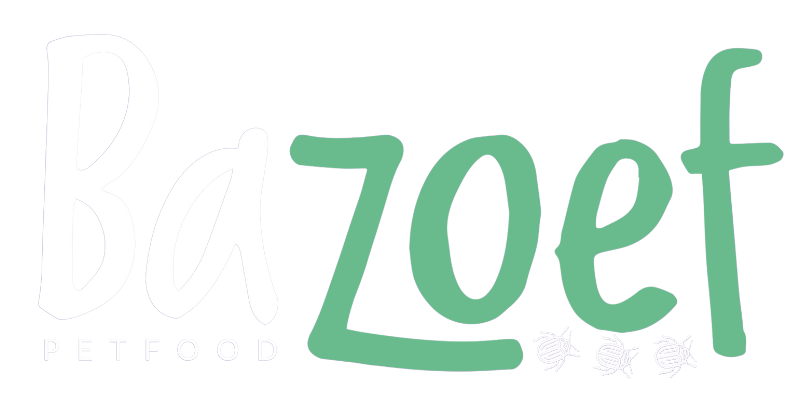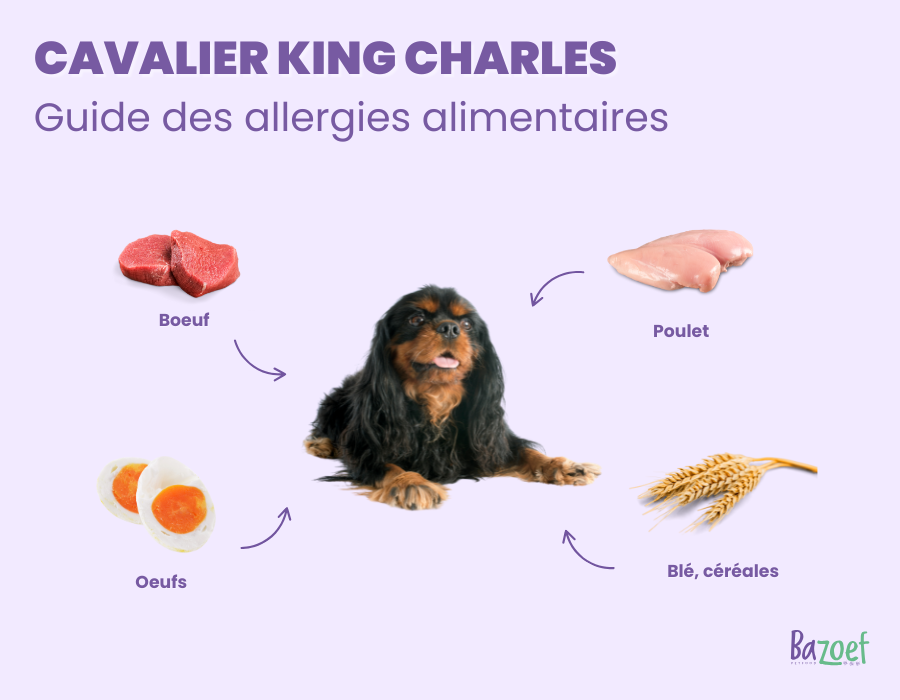The Cavalier King Charles Spaniel is a gentle, affectionate dog that forms strong bonds with its family.
However, this breed is also known for its sensitivity—especially when it comes to allergies.
Whether food-related, environmental, or contact-based, allergies can have a real impact on your dog’s quality of life.
Chronic itching, recurring ear infections, and digestive issues are all warning signs to watch for.
This comprehensive guide will help you better understand the various types of allergies in Cavalier King Charles Spaniels, recognize the symptoms, pinpoint potential causes, and explore suitable treatment and prevention options.

Food Allergies in Cavalier King Charles Spaniels
Understanding Food Allergies
Food allergies are a common cause of skin and digestive issues in Cavalier King Charles Spaniels.
They typically result from an immune system reaction to one or more proteins in the dog’s diet. Unlike an intolerance, which involves poor digestion, an allergy is an exaggerated immune response.
Typical symptoms may include:
- Persistent itching
- Chronic ear infections
- Digestive issues (diarrhea, gas)
- Loss of appetite or weight
Food allergies can develop at any age—even if your dog has been eating the same food for years.
Diagnosis usually involves a strict elimination diet over 8 to 12 weeks, followed by gradual reintroduction of ingredients under veterinary supervision.
Table: Common Food Triggers and Hypoallergenic Alternatives
| Common Trigger | Typical Symptoms | Hypoallergenic Alternatives |
| Chicken | Itching, redness, diarrhea | Insect protein, duck, white fish, lamb |
| Beef | Ear infections, hair loss, flatulence | Insect protein, duck, white fish, lamb |
| Wheat / Gluten (grains) | Skin inflammation, soft stools | Rice, sweet potato, peas |
| Dairy products | Vomiting, bloating | Lactose-free milk, or complete removal |
| Eggs | Skin rashes, itching | Remove or replace with plant-based proteins |

What to Do If Your Cavalier King Charles Has a Food Allergy
1. Consult a Veterinarian
If your dog shows early signs—such as persistent itching, diarrhea, vomiting, or frequent ear infections—it’s crucial to consult a veterinarian.
They will first rule out other potential causes like parasites, skin infections, or environmental allergies before considering a food allergy.
2. Start an Elimination Diet
An elimination diet is the most reliable method for diagnosing food allergies.
It involves feeding your dog a novel protein and carbohydrate source (ingredients they've never eaten before), or a hypoallergenic food made with hydrolyzed proteins.
This diet must be followed strictly for 8 to 12 weeks—with no treats, snacks, or deviations during the process.
3. Monitor the Results
If symptoms disappear during the elimination phase, this strongly suggests a food allergy.
To pinpoint the exact allergen, previously eliminated ingredients are gradually reintroduced one at a time under veterinary supervision. A quick return of symptoms usually reveals the specific trigger.
4. Adjust the Long-Term Diet
Once the allergen is identified, it must be permanently removed from your dog’s diet.
Hypoallergenic kibble or wet food—either commercial or homemade (with veterinary guidance)—is usually recommended.
Some Cavaliers may need to stay on this restricted diet for life.
5. Ongoing Monitoring with Veterinary Support
Regular check-ups are essential.
Your vet may suggest dietary supplements (like omega-3s or probiotics), skin treatments, or adjustments to the diet based on your dog’s evolving needs.

Symptoms of Food Allergies in Cavalier King Charles Spaniels
Skin Symptoms
Skin-related issues are the most common signs. Affected dogs often experience intense itching, especially around the ears, paws, belly, or muzzle.
Other visible symptoms may include redness, patches or rashes, localized hair loss, and sometimes scratch-induced wounds. Chronic or recurring ear infections are also frequently linked to food allergies.
At the first signs—persistent itching, diarrhea, vomiting, or recurring ear infections—it’s essential to consult a veterinarian.

Digestive Symptoms
Digestive issues are also common: chronic diarrhea, gas, occasional vomiting, soft or foul-smelling stools.
Some dogs may also show signs of reduced appetite or gradual weight loss.
General Symptoms
In some cases, the dog may seem more tired than usual, become irritable, or excessively lick its paws.
Bad breath or a dull, poor-quality coat can also accompany other symptoms.
Conclusion
Food allergies in Cavalier King Charles Spaniels can cause ongoing discomfort—for both the dog and its owner.
Fortunately, once the allergen is identified, targeted nutritional solutions can significantly improve quality of life.
Alternative protein sources play a key role in these solutions, helping avoid common allergens while still meeting your dog’s nutritional needs.
What About Insect Proteins?
Among alternative options, insect proteins stand out as an innovative and promising solution.
They are low-allergen, highly digestible, and rich in essential nutrients—making them especially well-suited for dogs with sensitive systems.
On top of that, insect protein production is environmentally friendly, making it a sustainable choice for owners who care about reducing their ecological footprint.
Other Hypoallergenic Alternatives
- Meats: Duck, lamb
- White fish: Such as cod or trout—often well tolerated
- Hydrolyzed proteins: Proteins that have been broken down to avoid triggering immune reactions
Every dog is different, so it’s crucial to tailor the diet on an individual basis—with guidance from a veterinarian.
By combining careful monitoring, a targeted diet, and modern solutions like insect protein, it’s absolutely possible to give your Cavalier King Charles a comfortable, allergy-free life.




